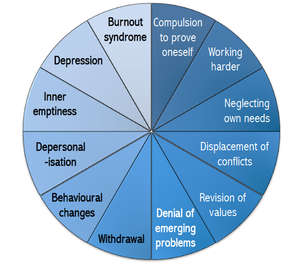What is burnout? "while short episodes of stress can be useful for some people in terms of motivation, long term stress in the workplace can be harmful to an individual’s health and wellbeing and can lead to burnout" (2016 report NHS England )
|
How do I know I have burnout? How long does it take to fix burnout? What is the best way to tackle burnout? Does burnout repeat? |
|
Burnout is more than "just stress" -
Burnout is more serious than merely having a stressful day/week/month. It is a state of emotional, physical and mental exhaustion arising from longterm ignored stress - leaving a person utterly drained, cynical about work and feeling that they are not accomplishing anything useful. Burnout can be hard to recognise in oneself as the process is slow to arise and multifactorial in nature. It is therefore easy to make excuses such as 'it's just tiredness due to long hours/overwork'. The term burnout was coined in 1974 Herbert Freudenberger first mentioned it in a published article over 40 year ago. (Freudenberger, H.J. (1974). Staff burnout. Journal of Social Issues). It originally referred to burnout in employees but there are other groups who risk getting burnout too ( students, athletes, carers, entrepreneurs for example).
When did burnout first get measured
Burnout is not a new concept. Freudenberger and Maslach were two pioneers in the 1970s research in methods to show the likely presence and severity of burnout. There is however still no single test that is completely diagnostic for burnout. Why? Burnout is complex, overlapping and multifactorial Does burnout exist? We say - yes.
Whether burnout exists as a distinct disease has been questioned by some experts. They argue that burnout is depression or anxiety. Others say burnout is a separate diagnosis. Either way one must be mindful of overlaps, coexistence with and contribution to other conditions that cause exhaustion. Research on burnout is extensive The number of research papers and reports in various industry publications grows daily (perhaps rather too much of it). This research to date has not stemmed the growth of burnout and has perhaps fuelled the confusion as to what it really is (due to widely differing research methodology and definitions). Burnout is a global health issue. Burnout has only recently (2019) been included World Health Organisation disease classification although burnout has been acknowledged by them as a public health problem for years. Perceived to be a Western disease - burnout is spreading into the developing world too. |
Too many people have burnout
The important ongoing debates about burnout do not detract from the fact that millions of people today are experiencing ill health because their work content, work style and workload is not sustainable. The economic impact is significant There is mounting evidence that burnout is costing us all dearly ….individuals, families, colleagues, employers, organisations and health care systems. Millions of pounds are being lost or spent because burnout is not being addressed effectively, consistently and in a cohesive manner. Burnout Geese offers current thinking
The views we share about burnout are based on trawling evidence based research and reports as well as decades of experience talking to those with burnout . This means our perspective on burnout can highlight the current main action steps you, your doctor or your organisation can take to combat it. We believe this to be vital while the debate about burnout being recognised an official distinct disease entity by all.... drones on. Please share the Burnout Geese message The sooner everyone realises how serious burnout can be, the damage it is doing to people and organisations and that it can be prevented or reversed - the better. A dictionary definition of burnoutNot quite the definition one expected but in some ways ...ironically accurate in that extreme burnout can reduce a person to no long being able to work and even to suicide.
burnout ˈbəːnaʊt/
noun : the reduction of a fuel or substance to nothing through use or combustion |

